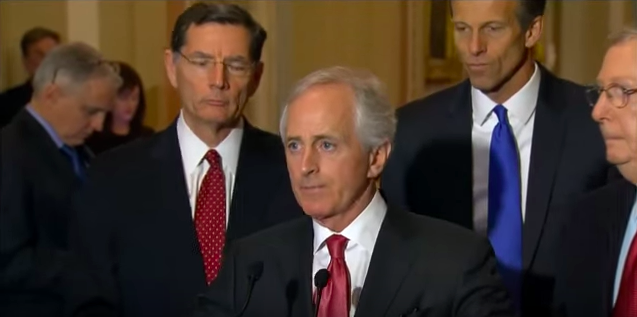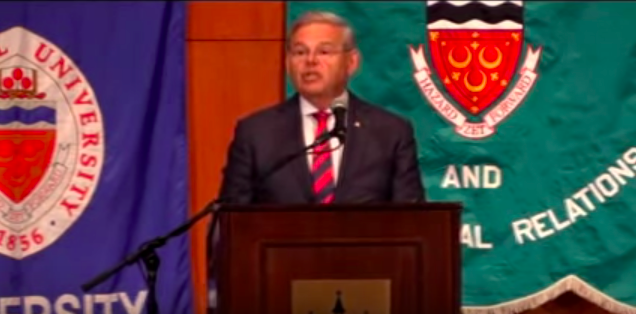In the days since becoming president, Donald Trump took swift action indicating that days of Obama antipathy were coming to an end, through his symbolic and substantive appointment of staunch Zionist David Friedman as U.S. Ambassador to Israel, to his putting Iran “on notice” and imposing sanctions against it, and his reversal of U.S. policy on Judea and Samaria.
But February 15, 2017, the day that President Trump and Israeli Prime Minister Benjamin Netanyahu stood side by side at the White House for the first time, may have marked the official end to the shameful Obama years.
I write about this heartening change for the benefit of all of Western civilization in a new piece at Conservative Review.
Here are seven fundamental takeaways from the recent Trump-Netanyahu joint press conference:
1. Mutual dedication to thwarting Iran and fighting Islamic supremacism more broadly:
Contrary to an Obama administration that coddled Iran and allowed Islamic supremacism to metastasize, President Trump and Prime Minister Netanyahu mutually agreed to mitigate the disaster that is the Iran Deal, including stopping Iran from ever obtaining a nuclear weapon and pushing back against its proxies like Hezbollah. Prime Minister Netanyahu lauded President Trump for his commitment to defeating jihadism more broadly, a fight Israel deals with daily in the form of Hamas, Hezbollah, and other terrorist threats. A common understanding of the nature of the Islamic supremacist threat to both nations, and Western civilization more broadly, is in and of itself a profound change.
2. Upending the two-state peace paradigm:
Turning the decades-old status quo on its head, the Trump administration indicated it would no longer be official U.S. policy to seek a peace agreement between the Israelis and Arabs of Palestine that takes the form of two states. As both leaders suggested, such an agreement could take many forms, but “labels” were secondary to substance.
3. The U.S. will not dictate the peace:
President Trump suggested that only a direct agreement between the Israelis and their Arab counterparts would clinch a deal. The U.S. will be happy to facilitate such conversations, including broader ones with Sunni Arab partners, but President Trump indicated a deal would not be forced on Israel by other parties. Moreover, President Trump appeared to endorse the preconditions Prime Minister Netanyahu put on such a peace, including recognition of Israel and its ability to adequately secure Judea and Samaria. Consistent with the administration’s prior statement, President Trump did not call the settlements an obstacle to peace, but did call for a pause seemingly in connection with forthcoming negotiations.
4. Recognition of Arab Jew-hatred as a primary obstacle to peace:
Both President Trump and Prime Minister Netanyahu spoke about the pervasive fundamental Jew-hatred animating large numbers of the Arabs of Palestine, which has stood as a main obstacle to peace. Trump did not draw moral equivalence between the Israelis and Arabs, solely stating that both sides would have to make compromises in a deal.
5. Engaging with Sunni Arab partners:
One of the few silver linings of the Obama administration’s Iran-strengthening policy is that Israel and its Arab neighbors were drawn closer than perhaps at any time in the last hundred years given their common existential threat from Tehran. President Trump and Prime Minister Netanyahu pledged to work with such powers on areas of common interest, presumably including countering jihadists that would threaten their regimes and in context of a broadly negotiated Israeli-Arab peace deal. One such potential plan floated on the eve of Prime Minister Netanyahu’s trip to the U.S. involves creating an area for the Arabs of Palestine spanning from Gaza to the Sinai.
6. Ensuring protection at the United Nations:
Contrary to the Obama administration, President Trump pledged to work to protect Israel from the many hostile nations comprising the United Nations. Trump’s statement comes on the heels of UN Ambassador Nikki Haley’s rejection of former Prime Minister of the Palestinian Authority Salam Fayyad’s appointment as the UN representative to Libya.
7. Rejecting the BDS movement:
Again contra the Obama administration, President Trump declared that he would oppose boycotts targeting Israel.
Prime Minister Netanyahu concluded the press conference by stating:
I’ve known the president and I’ve known his family and his team for a long time. There is no greater supporter of the Jewish people and the Jewish state than President Donald Trump. I think we should put that to rest.
The positive rapport between the two figures appeared genuine, based on a shared worldview and mutual respect.
Watching the press conference, it was self-evident that the pall cast over the relationship between the U.S. and Israel under President Obama has lifted, and the U.S.-Israel alliance reset at an auspicious moment in history.
A rebooted and robust U.S.-Israel relationship will play a central role if we are win the fight to preserve Judeo-Christian Western civilization against the jihadist forces that threaten our survival.
Read the whole thing here.









